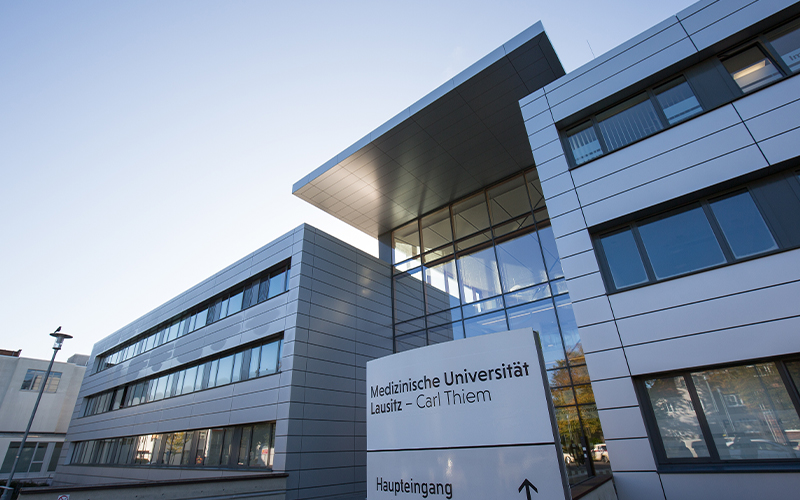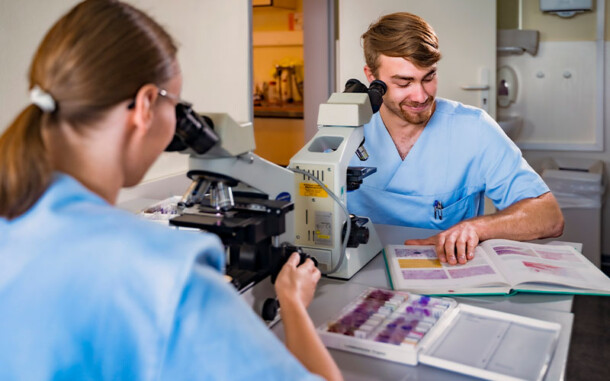
Master plan for hospital logistics transformation from a municipal hospital to the Medical University of Lusatia – Carl Thiem
On July 1, 2024, a new “medical era” began in Cottbus. The federal state of Brandenburg founded the Medical University of Lusatia – Carl Thiem (MUL-CT). The lignite mining region is about to undergo a far-reaching structural change to become the future “Lusatian Health Model Region” with the “Innovation Center University Medicine Cottbus” (IUC): Over the coming years, the former Carl Thiem Clinic Cottbus will be gradually established and expanded as a medical university for around 3.7 billion euros, co-financed by federal funds from the Coal Region Structural Strengthening Act and funds from the federal state of Brandenburg. LOGSOL impressed with its expertise in hospital logistics and was awarded the contract to develop the strategic concept for the supply and disposal of the new campus. Project Manager and Senior Logistics and Factory Planner Niklas Hofmann is “proud of this exciting project, in which LOGSOL can make a contribution to the development of the region.”
Forward-looking care concept for the hospital infrastructure
Mario Henneberger, who heads the Infrastructure business unit at LOGSOL, describes the future-oriented task for the MUL-CT as follows: “The challenging aspect of the university hospital is that patient care is supplemented by teaching and research. This creates synergies for all areas. However, this is only possible if the infrastructure and processes are optimally coordinated. We are therefore trying to integrate the system-relevant components of hospital care in the best possible way, in line with requirements.”
Over 1,300 additional full-time positions and 80 professorships are planned. The number of study places will increase to 1,400 by 2035, with the first students due to start their medical studies in the winter semester of 2026/27. LOGSOL took a comprehensive look at the logistics of the project. The question was true to the motto: From which location can a central supply center supply and dispose of the entire campus?
LOGSOL had to solve the challenging task of creating a strategic supply concept for the transformation from a municipal hospital to a university clinic in Germany’s easternmost city in a very short space of time. Project manager Hofmann coordinated a team of four logistics planners from LOGSOL and two research assistants from the Technical University of Dresden. After the experts had analyzed the existing structures and requirements, they determined additional goods flows and requirements for the provisional final expansion of the MUL-CT by 2038. This knowledge was incorporated into the building structure concept. “The challenge of the concept is to ensure patient care during the construction measures. The new construction measures must fit seamlessly into the existing and future planned structure,” says Niklas Hofmann. Particularly tricky: because existing logistics buildings are being partially demolished, interim spaces are needed to ensure supplies.

Hospital logistics master plan
LOGSOL took a close look at seven different logistics and supply areas. Health begins with food. In addition to patients and staff, the food supply at the MUL-CT must also take into account the future requirements of students and university employees. Is the kitchen concept with a central kitchen still sufficient? Various options had to be weighed up against each other and a preferred option selected. Textile logistics, cleaning and internal logistics were also put through their paces. Archive storage, waste management and hazardous materials storage as well as the hospital pharmacy were also examined.
“With the latter, it was particularly exciting to look at the preparation for unit-dose medication supply, in which medication management is optimized using robot-assisted solutions,” explains the project manager. The key questions were: Which functions and core areas can be combined for synergy effects? To what extent will future transport concepts take automated solutions along the entire supply chain into account?
LOGSOL managed the complex operation thanks to a strong on-site presence and numerous sprints. LOGSOL uses the short expert workshops as a tool for rapid knowledge transfer. “We intensively involved many internal hospital experts in the planning process as current and future users,” reports Niklas Hofmann. At the end of November 2024, the team delivered a logistics concept on time, including space and investment requirements. Hofmann found the assignment in the “Lusatia Health Model Region” “fascinating, because this strategy is intended to lay an essential foundation for the coming decades”.